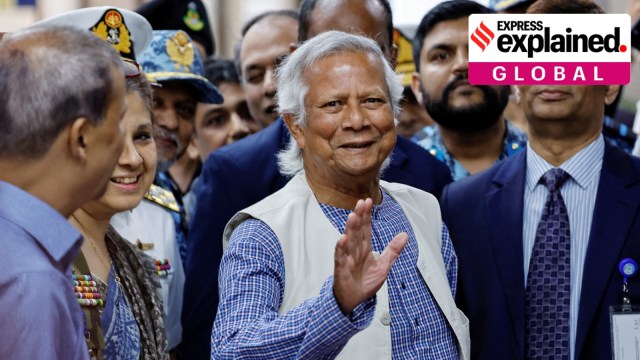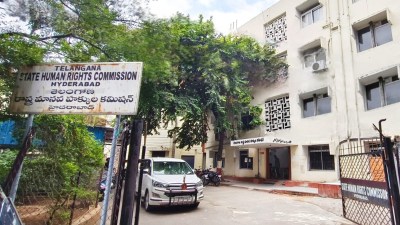Before Muhammad Yunus, Nobel laureates who went on to lead their country
Economist Muhammad Yunus, who won the Nobel Peace Prize in 2006, is set to lead Bangladesh’s interim government. But he will not be the first Nobel laureate to later lead his country.
 Nobel laureate Muhammad Yunus, who was recommended by Bangladeshi student leaders as the head of the interim government in Bangladesh, arrives at the Hazarat Shahjalal International Airport, in Dhaka, Bangladesh. (Reuters/Mohammad Ponir Hossain)
Nobel laureate Muhammad Yunus, who was recommended by Bangladeshi student leaders as the head of the interim government in Bangladesh, arrives at the Hazarat Shahjalal International Airport, in Dhaka, Bangladesh. (Reuters/Mohammad Ponir Hossain)Economist Muhammad Yunus, who won the Nobel Peace Prize in 2006, arrived in Dhaka earlier today. He is set to take oath as the head of Bangladesh’s interim government at around 8 pm today.
Yunus, however, will not be the first Nobel laureate to later lead their country. Five others have preceded him.
- 01
Lester B Pearson, Canada
 Lester B Pearson (1897-1972)
Lester B Pearson (1897-1972)Pearson was the Canadian prime minister from 1963 to 1968, and a leader of the Liberal Party. Despite running a minority government, he introduced a national pension plan, a family assistance program, broadened old-age security benefits, and laid the groundwork for universal healthcare in Canada. Pearson won the Nobel Peace Prize in 1957, for his role in resolving the Suez Crisis.
On July 26, 1956, Egypt President Gamal Abdel Nasser nationalised the Suez canal, which had till then been under the French and British-owned Suez Canal Company. Given the canal’s strategic importance as a connection between Europe and Asia, Nasser’s decision sparked international tensions, with Britain, France, and Israel eventually launching a military response to secure the canal.
A career diplomat, Pearson was Canada’s foreign minister and headed the country’s delegation to the United Nations when the crisis broke out. Initially, he worked towards a diplomatic solution to resolve the issue, but after hostilities commenced in October, he came up with the idea of the UN’s first large-scale peacekeeping force. After US pressure forced a ceasefire in November, Pearson’s solution allowed the aggressors to withdraw their forces appearing to have been defeated. Pearson’s Nobel selection committee credited him for “saving the world”.
- 02
Lech Wałęsa, Poland
 Lech Walesa (born 1943)
Lech Walesa (born 1943)Wałęsa served as Poland’s president from 1990-95, the first since 1926 to be democratically elected. An anti-communist dissident, he was a shipyard electrician who founded and led the Solidarity trade union, which in 1989 brought an end to communist rule in Poland. He won the Nobel Peace Prize in 1983 “for non-violent struggle for free trade unions and human rights in Poland”.
Since he began working at the Gdansk shipyard in 1967, Wałęsa was heavily involved in worker activism. He and other likeminded activists, in the 1970s, were frequently detained and under constant government surveillance for organising non-communist, anti-government trade unions. In August 1980 Wałęsa led the Gdansk shipyard strike. This in turn sparked strikes across much of the country with Wałęsa as the leader. The authorities eventually capitulated, and on August 31, the path breaking Gdansk Agreement was signed, giving workers the right to strike and to organise their own independent union.
However, in 1981, Wałęsa’s Solidarity union was banned, and Wałęsa arrested. He was released in 1982, but remained under strict surveillance. Nonetheless, he kept on his activism, which continued to pressure the unpopular communist government. Eventually, as the Soviet Union weakened, the Polish government agreed to negotiate with Wałęsa and free elections were held in 1990.
- 03
Aung San Suu Kyi, Myanmar
 Aung San Suu Kyi (born 1945)
Aung San Suu Kyi (born 1945)Suu Kyi served as the State Counsellor of Myanmar, the de-facto head of the government equivalent to a prime minister, 2016 to 2021 after leading Myanmar’s transition from military rule to partial democracy in the 2010s (progress which has since been reversed). She had won the Nobel Peace Prize in 1991 “for her non-violent struggle for democracy and human rights” in Myanmar. Suu Kyi rose to prominence during the uprising of 1988, when she founded the anti-junta National League for Democracy. In the 1990 elections, NLD won 81% of the seats in Parliament, but the junta refused to hand over power, leading to an international outcry about the situation in Myanmar. Suu Kyi herself was detained before the elections, and remained under house arrest for almost 15 years between 1989 and 2010. This made her one of the world’s most prominent political prisoners, and an icon for democracy in the Global South. After coming to power in 2015, Suu Kyi received widespread condemnation for her tacit support to the persecution and ethnic cleansing of the Rohingya people in Myanmar’s Rakhine state. In 2021, she was arrested after a coup restored military rule in Myanmar. She is serving a 27 year prison sentence on various graft charges.
- 04
Nelson Mandela, South Africa

Nelson Mandela (1918-2013)
Mandela served as the president of South Africa from 1994 to 1999. He was the first Black president of the country, elected in its first ever multi-racial elections. He was awarded the Nobel Peace Prize in 1993, jointly with then President Frederik Willem de Klerk, “for their work for the peaceful termination of the apartheid regime, and for laying the foundations for a new democratic South Africa”.
Mandela joined the African National Congress in 1943, and subsequently became active in fighting the policy of racial segregation in South Africa, formally introduced by the Nationalist Party in 1958. He was repeatedly arrested for seditious activities and was unsuccessfully prosecuted in the 1956 Treason Trial.
He would eventually be arrested and sentenced to life in prison in 1962 for conspiring to overthrow the government. He would spend the next 27 years in prison. During this time he rose to international fame as a symbol of resistance against the anti-apartheid movement. As international pressure grew to end apartheid, and fears of a racial civil war in South Africa became ever so pressing, de Klerk released Mandela in 1990. Over the next four years, the two negotiated a peaceful end to apartheid.
- 05
José Ramos-Horta, East Timor
 Jose Ramos Horta (born 1949)
Jose Ramos Horta (born 1949)Ramos-Horta has been the president of East Timor since 2022. He previously held the position from 2007 to 2012, and the prime ministership from 2006 to 2007. He won the Nobel Peace Prize in 1996 along with Carlos Filipe Ximenes Belo, for working “towards a just and peaceful solution to the conflict in East Timor”.
The island of Timor sits just north of Australia, and to the southeast of the Indonesian island of Sulawesi. During the colonial era, the Dutch and the Portuguese split the island in half. The western part of the island went to Indonesia after the Dutch formally recognised Indonesian independence in 1949. The Portuguese would administer East Timor till 1975. However, at the end of Portuguese rule, Indonesia occupied the whole island.
Thus began a resistance movement to free East Timor, and a conflict which went on for the next 20 years. José Ramos-Horta was one of the leaders of the resistance who went around the world pleading for the cause of East Timorese independence. In 1992 he presented a peace plan which eventually laid the foundation for Indonesian withdrawal from East Timor, and its people’s self-determination. In 2002, East Timor, also known as Timor-Leste, became the first new sovereign state of the 21st century.
Note: This list only includes those who won the Nobel prize before becoming the head of state/government of their country. Many others have won after serving their terms (former Israel PM Shimon Peres or former US President Jimmy Carter) or during their terms (former US President Barack Obama or former UK PM Winston Churchill. Of the 30 Nobel recipients to serve as a country’s head of state/government, 29 won the Nobel Peace Prize with Churchill, who won the Nobel for Literature in 1953, the only exception.
- 01
- 02
- 03
- 04
- 05


 Lester B Pearson (1897-1972)
Lester B Pearson (1897-1972) Lech Walesa (born 1943)
Lech Walesa (born 1943) Aung San Suu Kyi (born 1945)
Aung San Suu Kyi (born 1945)
 Jose Ramos Horta (born 1949)
Jose Ramos Horta (born 1949)



































